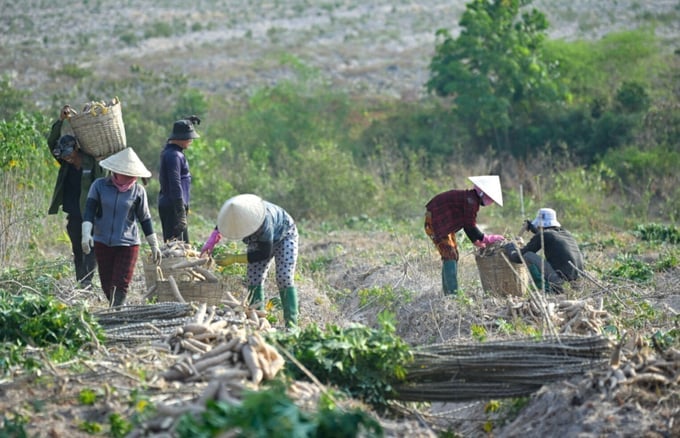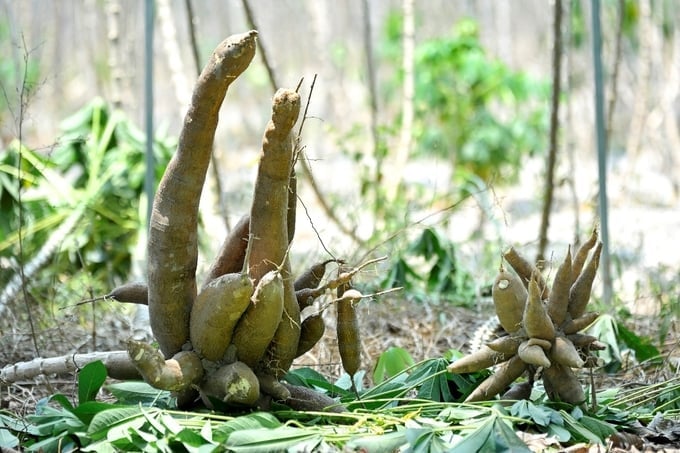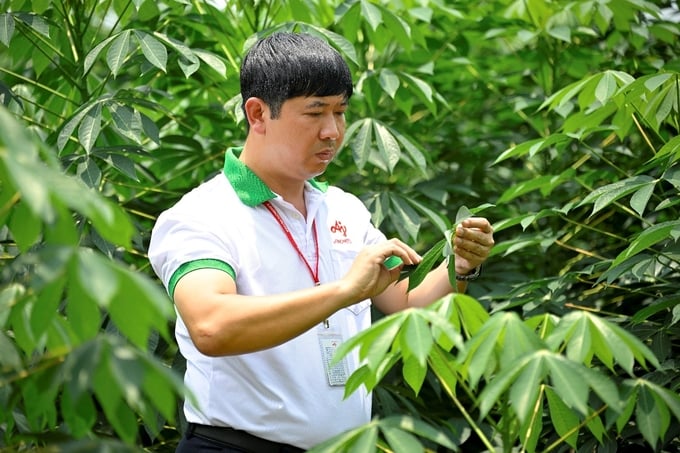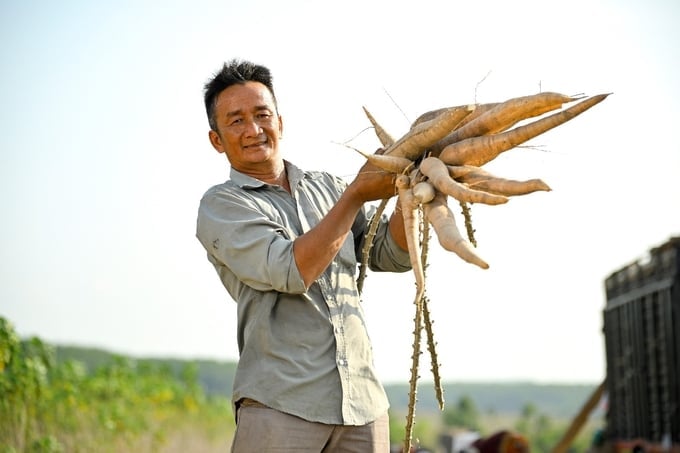May 29, 2025 | 12:41 GMT +7
May 29, 2025 | 12:41 GMT +7
Hotline: 0913.378.918
May 29, 2025 | 12:41 GMT +7
Hotline: 0913.378.918
Ajinomoto Vietnam launched a sustainable cassava project in April 2023 with the aim of supporting cassava farmers in increasing yield and improving livelihoods. After twelve months of implementation, the project has yielded substantial results, with cassava crop yields nearly doubling.
Cassava is a major economic crop with significant economic value and widespread production across various regions including the Southeast region, the Central Highlands, and South Central Coast of Vietnam. Notably, the crop is extensively produced within the provinces of Tay Ninh, Binh Phuoc, and Dong Nai. Despite its substantial economic value, low-quality seeds and cassava mosaic disease pose as significant challenges to the traditional cassava production method.

Farmers harvesting cassava in Binh Phuoc, a province with one of the largest cassava production areas in Vietnam.
Nguyen Hoang Son, a cassava farmer in Binh Phuoc province, shared: "With the traditional cassava production method, my family often experience low crop yields due to pest damage, low-quality seeds, and notably, cassava mosaic disease. These factors cause cassava yield to plummet by 40 to 50%, resulting in significant losses for our family's income."
With the aim of supporting cassava farmers in increasing yield, improving income, and establishing a stable livelihood, Ajinomoto Vietnam has collaborated with agricultural research centers and scientists to research, and implement a sustainable cassava project starting from April 2023. Accordingly, the project covers 78.6 hectares of cassava production area, with 18 participating households from the provinces of Dong Nai, Binh Phuoc, Tay Ninh, and Ba Ria - Vung Tau.
The project provides farmers with the new HN1 variety, which features high yield and resistance to cassava mosaic disease, while also providing instructions on advanced farming techniques. Participating farmers receive technical guidance on soil preparation, planting, fertilization, and pest management in a scientific manner, including the use of AMI-AMIα bio-fertilizer. Researched, developed, and produced by Ajinomoto Vietnam, this bio-fertilizer replaces chemical fertilizers, thereby promoting cassava growth as well as reducing production costs.

A comparison of cassava tubers after the project implementation (left) and before (right) reveals that cassava from the new HN1 variety is significantly larger in size.
After twelve months of implementation, the initial stages of the project have yielded remarkable results. Notably, the cassava yields of participating household nearly doubled from 21 to 40 tons per hectare. Additionally, the starch content of the harvested cassava is noticeably higher, enabling farmers to increase income and stabilize their livelihoods.
Starting from May 2024, Ajinomoto Vietnam developed and introduced the "Cassava - Aji" mobile application. The software allows farmers to promptly detect pests and diseases; monitor production processes and crops, and effectively control the cassava care process. The company has also collaborated with distributors to provide participating farmers with market access.

The "Cassava Aji" application developed by Ajinomoto Vietnam assists farmers in identifying pests and diseases through images.
Nguyen Hoang Son added: "After participating in the project, out cassava yield has nearly doubled from 21 to 40 tons per hectare, with higher starch content. As a result, our income has significantly improved, stabilizing our family's livelihoods and encouraging us to continue production. The project has also provided market access for our harvested cassava. Local farmers are delighted and hopeful for the widespread development and implementation of the project."

Le Huy Anh inspecting the development of cassava plants within the project site in Tay Ninh province.
Le Huy Anh, a representative from the Agricultural Development Department at Ajinomoto Vietnam, commented: "Going forward, Ajinomoto Vietnam will continue to collaborate with Vietnamese agricultural agencies and scientists to replicate this model, with the aim of supporting more farmers across various provinces nationwide."

Nguyen Hoang Son, a farmer in Binh Phuoc province, harvesting cassava cultivated using the new farming method.
In addition to improving the livelihoods of farmers, the project contributes to reducing CO2 emissions through the use of bio-fertilizers as a substitution for chemical fertilizers. Ajinomoto Vietnam aims to implement the project on over 20,000 hectares of cassava production area by 2030, and reduce CO2 emissions by over 11,000 tons; thereby mitigating environmental impact.
In addition to its contributions to sustainable agriculture and environmental conservation goals, Ajinomoto Vietnam is implementing valuable initiatives in nutrition and healthcare with the aim of promoting the well-being and happiness of the Vietnamese people. Notable initiatives include the School Meal Project, the Maternal and Child Nutrition Program, the Vietnam Nutrition Enhancement Project (VINEP), among others.
Translated by Nguyen Hai Long

(VAN) FAO’s Director-General addresses the 5th Baghdad International Water Conference.
/2025/05/26/1716-4-nongnghiep-191706.jpg)
(VAN) Chain linkages, technological innovation, and raw material zoning are three strategic pillars for the coconut industry to strongly develop and elevate its position on the global agricultural map.
![Advanced mariculture – an inevitable trend: [4] Accompanied by scientists](https://t.ex-cdn.com/nongnghiepmoitruong.vn/608w/files/sohk/2025/05/13/1941-pgsts-vo-van-nha-140958_717.jpg)
(VAN) According to Assoc. Prof. Dr. Vo Van Nha, Director of the RIA III, the development of advanced offshore mariculture is no longer an option but an essential path for Vietnam’s fisheries sector.

(VAN) Vietnam is intensifying the development of mollusk farming areas that meet international standards, aiming for sustainable growth and enhancing its export position in the global seafood market.
![Advanced mariculture – an inevitable trend: [3] Policy-driven momentum](https://t.ex-cdn.com/nongnghiepmoitruong.vn/608w/files/doanhtq/2025/05/21/0104-0616-0348-nuoi-bien-170339_789.jpg)
(VAN) To ensure the success of offshore mariculture that uses advanced technologies, it is essential to establish supportive policies that inspire both individuals and enterprises to invest with confidence.
![Advanced mariculture – an inevitable trend: [2] Outstanding results](https://t.ex-cdn.com/nongnghiepmoitruong.vn/608w/files/sohk/2025/05/12/4632-4136-nuoi-bien-11-164117_819.jpg)
(VAN) Pilot models of high-tech offshore mariculture in Vietnam, particularly in the South Central Coast region, have demonstrated exceptional economic returns and sustainability, setting a new direction for the country’s aquaculture industry.
![Advanced mariculture – an inevitable trend: [1] Moving offshore](https://t.ex-cdn.com/nongnghiepmoitruong.vn/608w/files/phucpm/2025/05/18/0252-2436-nuoi-bien-6-162148_783.jpg)
(VAN) Mariculture using advanced technology and moving offshore is an inevitable trend, as nearshore areas increasingly reveal limitations.